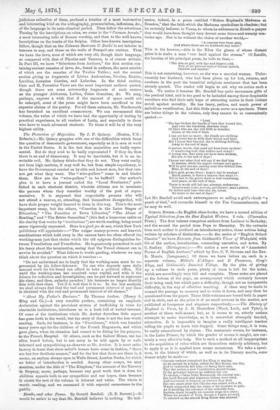The Protection of Majorities. By J. P. Quincy. (Boston, U.S.:
Roberts.)—Mr. Quincy grapples with one of the difficulties which beset the question of democratic government, especially as it is seen at work in the United States. It is the fact that majorities are badly repre- sented. But do they wish to be badly represented ? If they do, then there is an end of democracy. It may be inevitable, but it is an in- evitable evil. Mr. Quincy thinks that they do not. They want really, not from high motives, it may well be, but from simple expediency, to have the Government carried on by able and honest men, but they can- not get what they want. The " wire-pullers " come in and hinder them. How are the " wire-pullers " to be baffled? Our author's plan is to have a journal called the "Local Nominator," pub- lished in each electoral district, wherein citizens are to nominate the persons whom they consider worthy of the post of repre- sentative. It is supposed that respectable persons who will not attend a caucus, or, attending, find themselves disregarded, will have their proper weight insured to them in this way. This is the most important essay, but the others, "Coercion in the Later Stages of Education," " The Function of Town Libraries," " The Abuse of Reading," and "The Better Samaritan" (this last a humorous satire on the charity that works by "institutions ") are worth reading, being sound sense vigorously expressed. Here is a good jeu de mot, which New York politicians will appreciate :—" The vulgar money-powers and knavish combinations which hold sway in the caucus have too often offered the working-man just that choice which the old epigram distinguishes be- tween Tweedledum and Tweedledee. He is graciously permitted to suit his fancy about the termination, seeing that the Tweed element can in nowise be avoided." What follows is worth quoting, whatever we may think about the question on which it touches:—
"Do not understand mo to imply that the working-man must be re- presented by his fellow-labourer. No one who depends upon daily manual work for his bread can afford to take a political office. Not until the working-man has acquired some capital, and with it the leisure for reflection and investigation, can he put forward to represent his class; and then, unlucky paradox ! his interests no longer identify him with that class. Yet it is well that it is so. In the last analysis, we shall always find that the real and permanent interest of any class is identical with the real and permanent interest of all classes."


































 Previous page
Previous page